Learning About Development: Personal Reflection and Future Plans
VerifiedAdded on 2022/09/18
|12
|2991
|49
Homework Assignment
AI Summary
This assignment provides a detailed personal analysis of the student's life, focusing on developmental stages, significant life experiences, and future goals. The student, a 61-year-old individual, reflects on their family background, childhood, adolescence, adulthood, and the impact of key life events such as the loss of their father and their career changes. The analysis incorporates various psychological theories, including Erikson's theory of psychosocial development, Kohlberg's stages of moral development, Krumboltz's social learning theory, Piaget's theory on midlife crisis, and family systems theory. The student discusses the application of these theories to their experiences, such as identity development, career choices, and family dynamics. The assignment also includes a two-year personal development plan with learning objectives, planned activities, and rationale, aiming to enhance skills in counseling and therapy, and prepare for a career change. The student aims to become a registered counselor/therapist/psychologist.
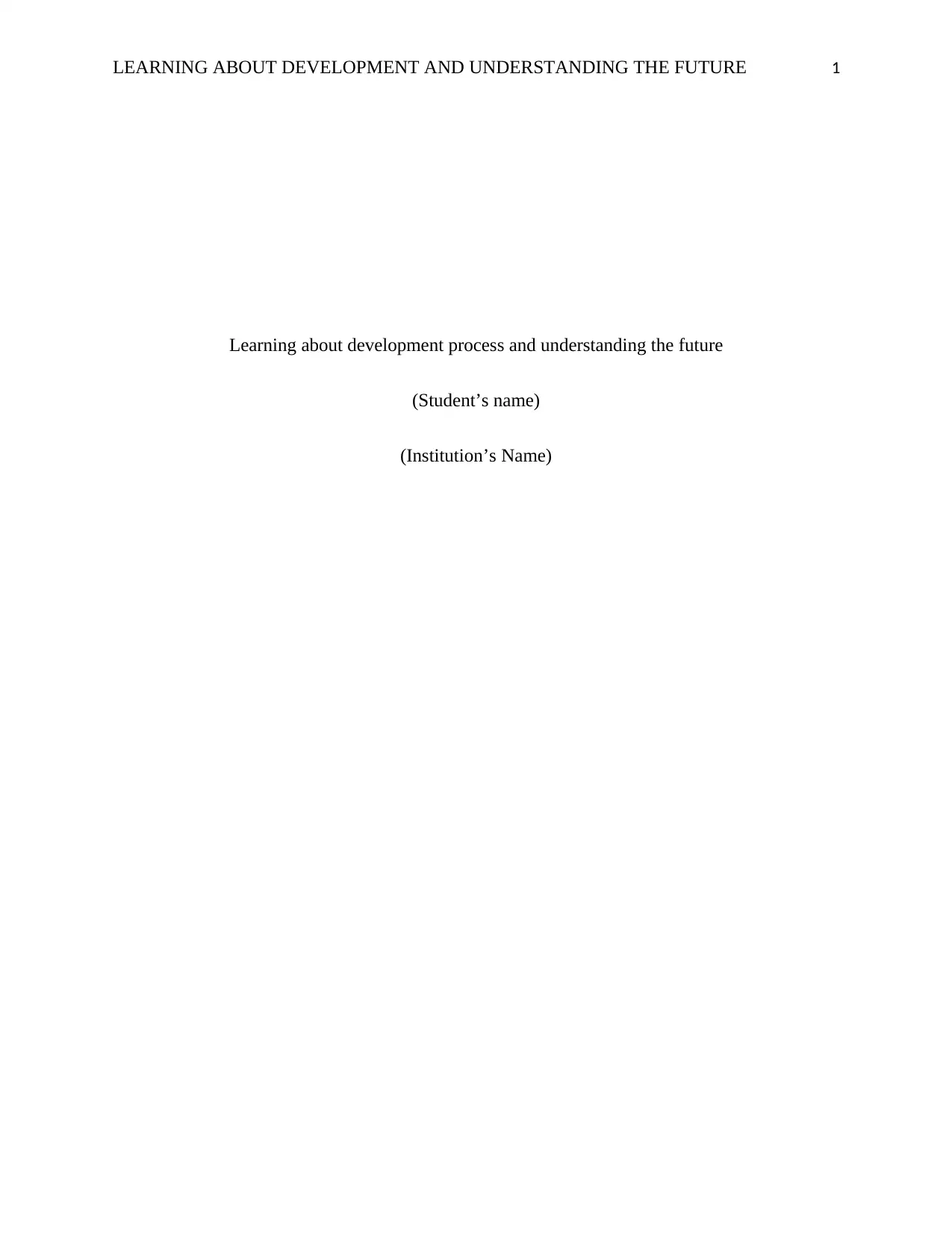
LEARNING ABOUT DEVELOPMENT AND UNDERSTANDING THE FUTURE 1
Learning about development process and understanding the future
(Student’s name)
(Institution’s Name)
Learning about development process and understanding the future
(Student’s name)
(Institution’s Name)
Paraphrase This Document
Need a fresh take? Get an instant paraphrase of this document with our AI Paraphraser
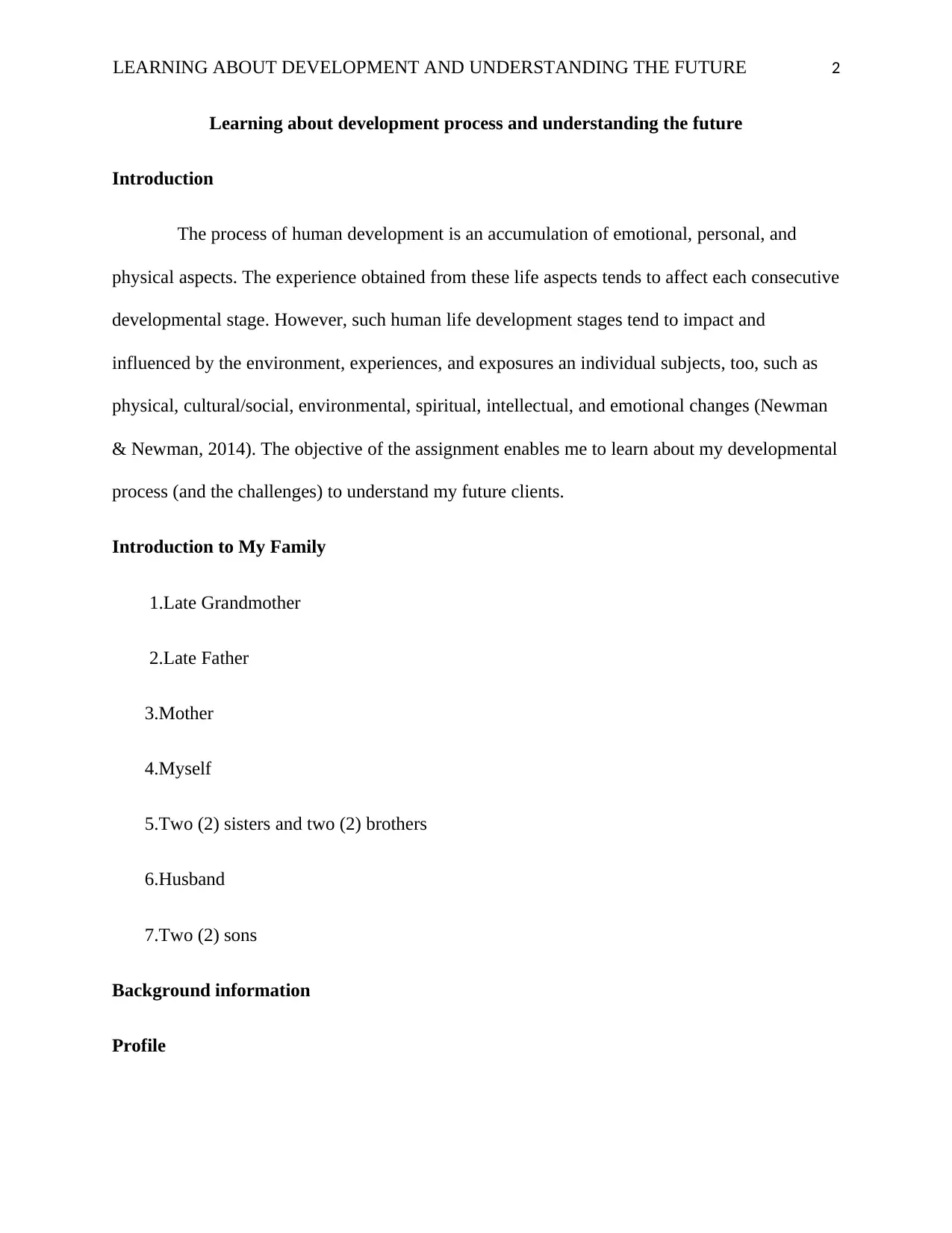
LEARNING ABOUT DEVELOPMENT AND UNDERSTANDING THE FUTURE 2
Learning about development process and understanding the future
Introduction
The process of human development is an accumulation of emotional, personal, and
physical aspects. The experience obtained from these life aspects tends to affect each consecutive
developmental stage. However, such human life development stages tend to impact and
influenced by the environment, experiences, and exposures an individual subjects, too, such as
physical, cultural/social, environmental, spiritual, intellectual, and emotional changes (Newman
& Newman, 2014). The objective of the assignment enables me to learn about my developmental
process (and the challenges) to understand my future clients.
Introduction to My Family
1.Late Grandmother
2.Late Father
3.Mother
4.Myself
5.Two (2) sisters and two (2) brothers
6.Husband
7.Two (2) sons
Background information
Profile
Learning about development process and understanding the future
Introduction
The process of human development is an accumulation of emotional, personal, and
physical aspects. The experience obtained from these life aspects tends to affect each consecutive
developmental stage. However, such human life development stages tend to impact and
influenced by the environment, experiences, and exposures an individual subjects, too, such as
physical, cultural/social, environmental, spiritual, intellectual, and emotional changes (Newman
& Newman, 2014). The objective of the assignment enables me to learn about my developmental
process (and the challenges) to understand my future clients.
Introduction to My Family
1.Late Grandmother
2.Late Father
3.Mother
4.Myself
5.Two (2) sisters and two (2) brothers
6.Husband
7.Two (2) sons
Background information
Profile
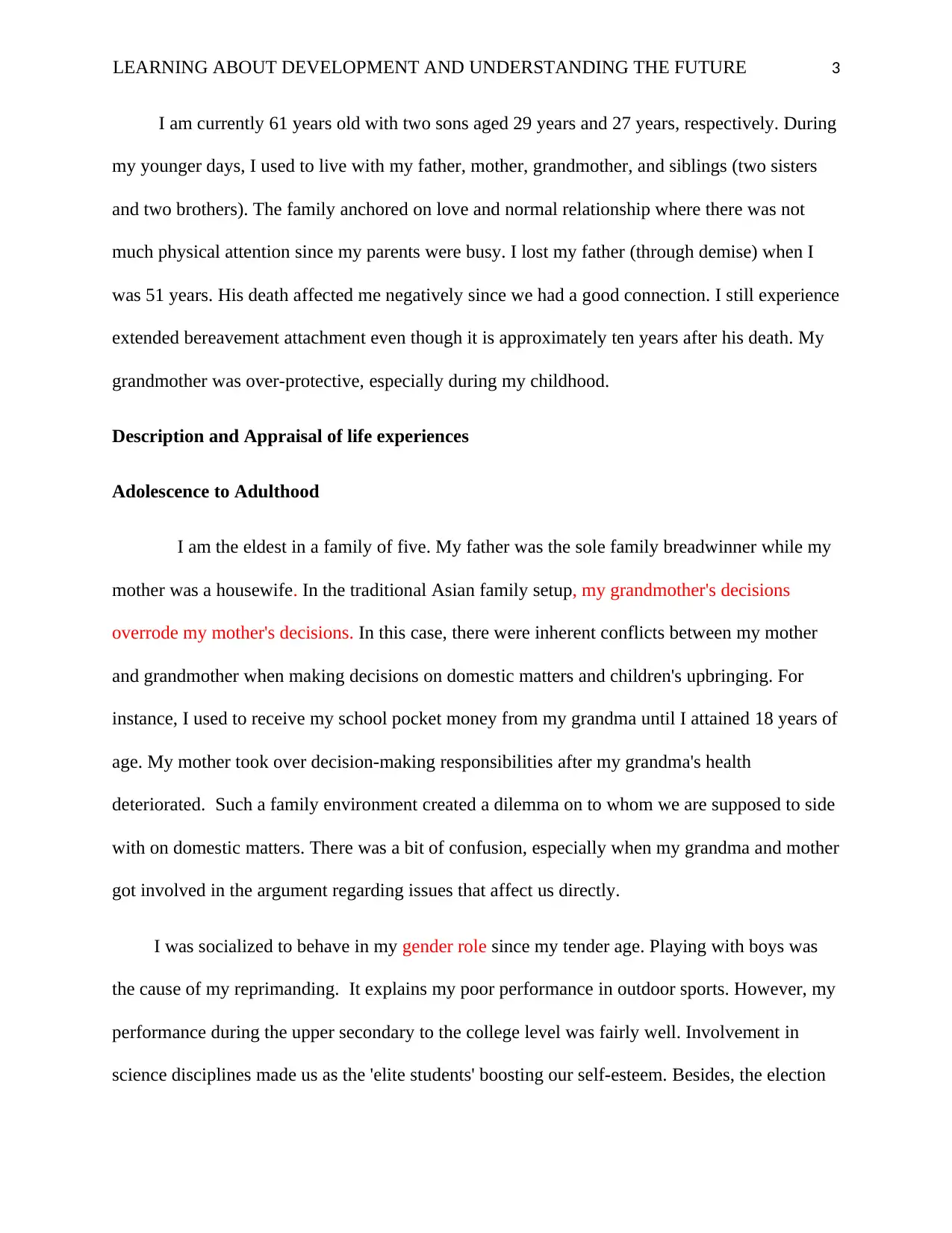
LEARNING ABOUT DEVELOPMENT AND UNDERSTANDING THE FUTURE 3
I am currently 61 years old with two sons aged 29 years and 27 years, respectively. During
my younger days, I used to live with my father, mother, grandmother, and siblings (two sisters
and two brothers). The family anchored on love and normal relationship where there was not
much physical attention since my parents were busy. I lost my father (through demise) when I
was 51 years. His death affected me negatively since we had a good connection. I still experience
extended bereavement attachment even though it is approximately ten years after his death. My
grandmother was over-protective, especially during my childhood.
Description and Appraisal of life experiences
Adolescence to Adulthood
I am the eldest in a family of five. My father was the sole family breadwinner while my
mother was a housewife. In the traditional Asian family setup, my grandmother's decisions
overrode my mother's decisions. In this case, there were inherent conflicts between my mother
and grandmother when making decisions on domestic matters and children's upbringing. For
instance, I used to receive my school pocket money from my grandma until I attained 18 years of
age. My mother took over decision-making responsibilities after my grandma's health
deteriorated. Such a family environment created a dilemma on to whom we are supposed to side
with on domestic matters. There was a bit of confusion, especially when my grandma and mother
got involved in the argument regarding issues that affect us directly.
I was socialized to behave in my gender role since my tender age. Playing with boys was
the cause of my reprimanding. It explains my poor performance in outdoor sports. However, my
performance during the upper secondary to the college level was fairly well. Involvement in
science disciplines made us as the 'elite students' boosting our self-esteem. Besides, the election
I am currently 61 years old with two sons aged 29 years and 27 years, respectively. During
my younger days, I used to live with my father, mother, grandmother, and siblings (two sisters
and two brothers). The family anchored on love and normal relationship where there was not
much physical attention since my parents were busy. I lost my father (through demise) when I
was 51 years. His death affected me negatively since we had a good connection. I still experience
extended bereavement attachment even though it is approximately ten years after his death. My
grandmother was over-protective, especially during my childhood.
Description and Appraisal of life experiences
Adolescence to Adulthood
I am the eldest in a family of five. My father was the sole family breadwinner while my
mother was a housewife. In the traditional Asian family setup, my grandmother's decisions
overrode my mother's decisions. In this case, there were inherent conflicts between my mother
and grandmother when making decisions on domestic matters and children's upbringing. For
instance, I used to receive my school pocket money from my grandma until I attained 18 years of
age. My mother took over decision-making responsibilities after my grandma's health
deteriorated. Such a family environment created a dilemma on to whom we are supposed to side
with on domestic matters. There was a bit of confusion, especially when my grandma and mother
got involved in the argument regarding issues that affect us directly.
I was socialized to behave in my gender role since my tender age. Playing with boys was
the cause of my reprimanding. It explains my poor performance in outdoor sports. However, my
performance during the upper secondary to the college level was fairly well. Involvement in
science disciplines made us as the 'elite students' boosting our self-esteem. Besides, the election
⊘ This is a preview!⊘
Do you want full access?
Subscribe today to unlock all pages.

Trusted by 1+ million students worldwide
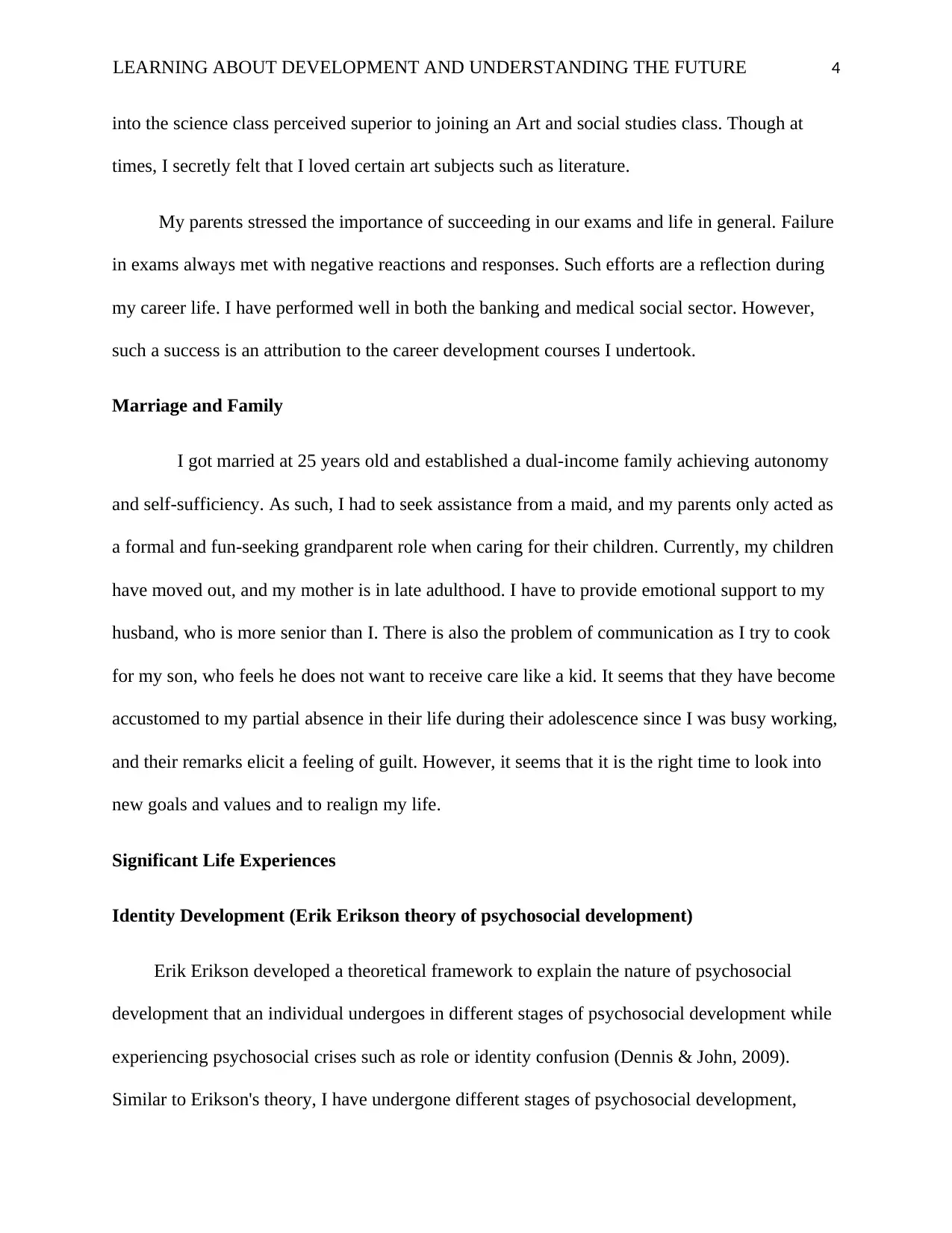
LEARNING ABOUT DEVELOPMENT AND UNDERSTANDING THE FUTURE 4
into the science class perceived superior to joining an Art and social studies class. Though at
times, I secretly felt that I loved certain art subjects such as literature.
My parents stressed the importance of succeeding in our exams and life in general. Failure
in exams always met with negative reactions and responses. Such efforts are a reflection during
my career life. I have performed well in both the banking and medical social sector. However,
such a success is an attribution to the career development courses I undertook.
Marriage and Family
I got married at 25 years old and established a dual-income family achieving autonomy
and self-sufficiency. As such, I had to seek assistance from a maid, and my parents only acted as
a formal and fun-seeking grandparent role when caring for their children. Currently, my children
have moved out, and my mother is in late adulthood. I have to provide emotional support to my
husband, who is more senior than I. There is also the problem of communication as I try to cook
for my son, who feels he does not want to receive care like a kid. It seems that they have become
accustomed to my partial absence in their life during their adolescence since I was busy working,
and their remarks elicit a feeling of guilt. However, it seems that it is the right time to look into
new goals and values and to realign my life.
Significant Life Experiences
Identity Development (Erik Erikson theory of psychosocial development)
Erik Erikson developed a theoretical framework to explain the nature of psychosocial
development that an individual undergoes in different stages of psychosocial development while
experiencing psychosocial crises such as role or identity confusion (Dennis & John, 2009).
Similar to Erikson's theory, I have undergone different stages of psychosocial development,
into the science class perceived superior to joining an Art and social studies class. Though at
times, I secretly felt that I loved certain art subjects such as literature.
My parents stressed the importance of succeeding in our exams and life in general. Failure
in exams always met with negative reactions and responses. Such efforts are a reflection during
my career life. I have performed well in both the banking and medical social sector. However,
such a success is an attribution to the career development courses I undertook.
Marriage and Family
I got married at 25 years old and established a dual-income family achieving autonomy
and self-sufficiency. As such, I had to seek assistance from a maid, and my parents only acted as
a formal and fun-seeking grandparent role when caring for their children. Currently, my children
have moved out, and my mother is in late adulthood. I have to provide emotional support to my
husband, who is more senior than I. There is also the problem of communication as I try to cook
for my son, who feels he does not want to receive care like a kid. It seems that they have become
accustomed to my partial absence in their life during their adolescence since I was busy working,
and their remarks elicit a feeling of guilt. However, it seems that it is the right time to look into
new goals and values and to realign my life.
Significant Life Experiences
Identity Development (Erik Erikson theory of psychosocial development)
Erik Erikson developed a theoretical framework to explain the nature of psychosocial
development that an individual undergoes in different stages of psychosocial development while
experiencing psychosocial crises such as role or identity confusion (Dennis & John, 2009).
Similar to Erikson's theory, I have undergone different stages of psychosocial development,
Paraphrase This Document
Need a fresh take? Get an instant paraphrase of this document with our AI Paraphraser
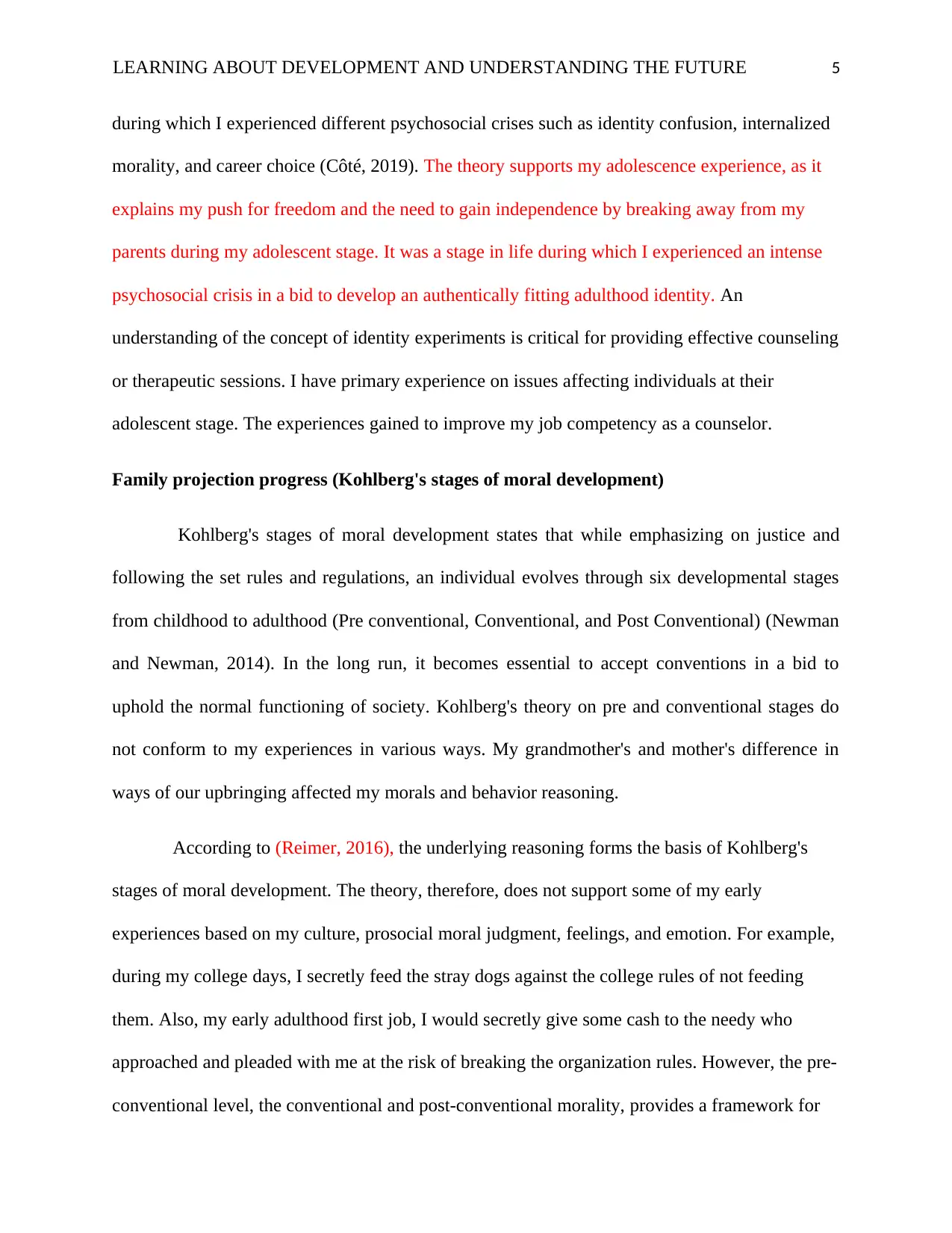
LEARNING ABOUT DEVELOPMENT AND UNDERSTANDING THE FUTURE 5
during which I experienced different psychosocial crises such as identity confusion, internalized
morality, and career choice (Côté, 2019). The theory supports my adolescence experience, as it
explains my push for freedom and the need to gain independence by breaking away from my
parents during my adolescent stage. It was a stage in life during which I experienced an intense
psychosocial crisis in a bid to develop an authentically fitting adulthood identity. An
understanding of the concept of identity experiments is critical for providing effective counseling
or therapeutic sessions. I have primary experience on issues affecting individuals at their
adolescent stage. The experiences gained to improve my job competency as a counselor.
Family projection progress (Kohlberg's stages of moral development)
Kohlberg's stages of moral development states that while emphasizing on justice and
following the set rules and regulations, an individual evolves through six developmental stages
from childhood to adulthood (Pre conventional, Conventional, and Post Conventional) (Newman
and Newman, 2014). In the long run, it becomes essential to accept conventions in a bid to
uphold the normal functioning of society. Kohlberg's theory on pre and conventional stages do
not conform to my experiences in various ways. My grandmother's and mother's difference in
ways of our upbringing affected my morals and behavior reasoning.
According to (Reimer, 2016), the underlying reasoning forms the basis of Kohlberg's
stages of moral development. The theory, therefore, does not support some of my early
experiences based on my culture, prosocial moral judgment, feelings, and emotion. For example,
during my college days, I secretly feed the stray dogs against the college rules of not feeding
them. Also, my early adulthood first job, I would secretly give some cash to the needy who
approached and pleaded with me at the risk of breaking the organization rules. However, the pre-
conventional level, the conventional and post-conventional morality, provides a framework for
during which I experienced different psychosocial crises such as identity confusion, internalized
morality, and career choice (Côté, 2019). The theory supports my adolescence experience, as it
explains my push for freedom and the need to gain independence by breaking away from my
parents during my adolescent stage. It was a stage in life during which I experienced an intense
psychosocial crisis in a bid to develop an authentically fitting adulthood identity. An
understanding of the concept of identity experiments is critical for providing effective counseling
or therapeutic sessions. I have primary experience on issues affecting individuals at their
adolescent stage. The experiences gained to improve my job competency as a counselor.
Family projection progress (Kohlberg's stages of moral development)
Kohlberg's stages of moral development states that while emphasizing on justice and
following the set rules and regulations, an individual evolves through six developmental stages
from childhood to adulthood (Pre conventional, Conventional, and Post Conventional) (Newman
and Newman, 2014). In the long run, it becomes essential to accept conventions in a bid to
uphold the normal functioning of society. Kohlberg's theory on pre and conventional stages do
not conform to my experiences in various ways. My grandmother's and mother's difference in
ways of our upbringing affected my morals and behavior reasoning.
According to (Reimer, 2016), the underlying reasoning forms the basis of Kohlberg's
stages of moral development. The theory, therefore, does not support some of my early
experiences based on my culture, prosocial moral judgment, feelings, and emotion. For example,
during my college days, I secretly feed the stray dogs against the college rules of not feeding
them. Also, my early adulthood first job, I would secretly give some cash to the needy who
approached and pleaded with me at the risk of breaking the organization rules. However, the pre-
conventional level, the conventional and post-conventional morality, provides a framework for
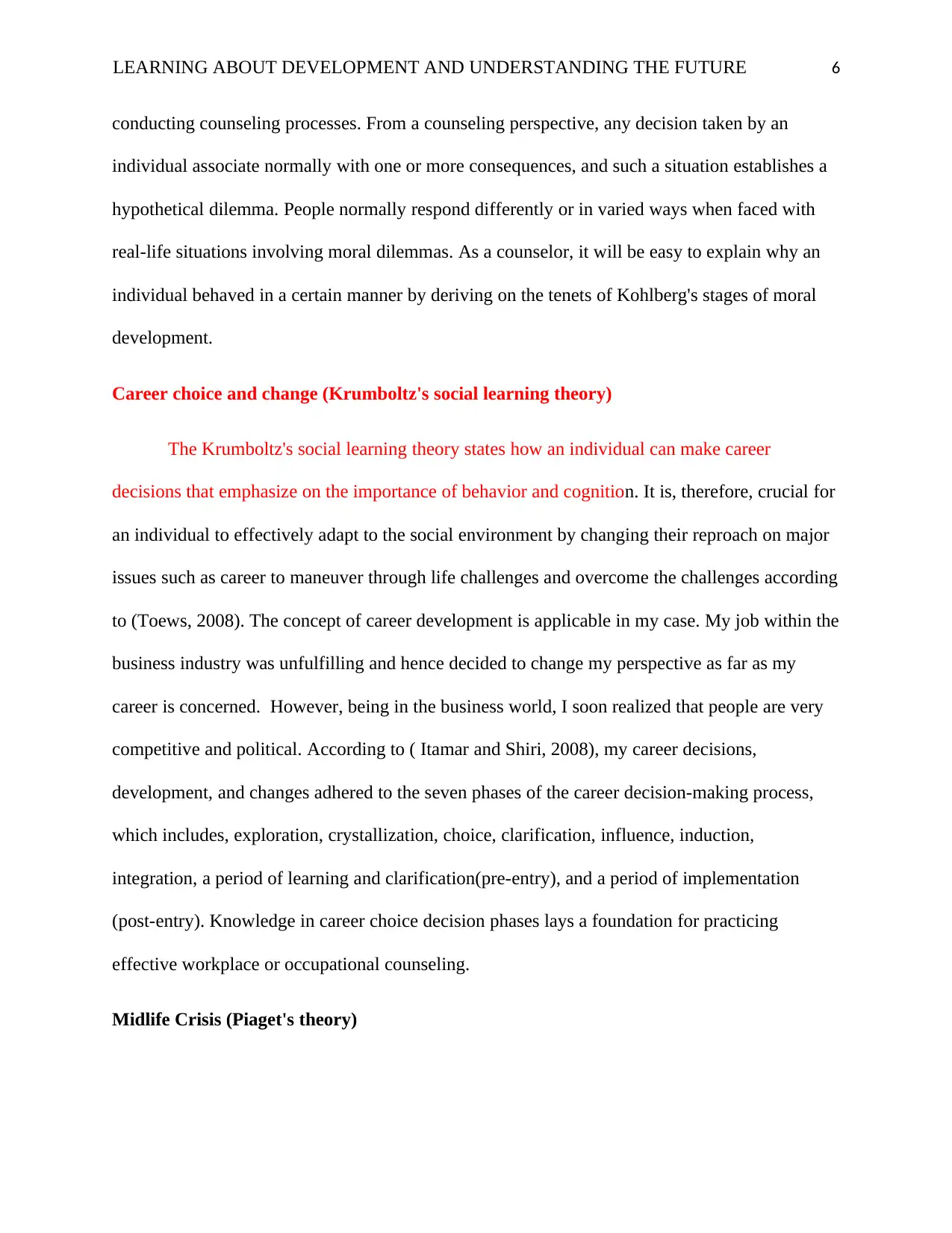
LEARNING ABOUT DEVELOPMENT AND UNDERSTANDING THE FUTURE 6
conducting counseling processes. From a counseling perspective, any decision taken by an
individual associate normally with one or more consequences, and such a situation establishes a
hypothetical dilemma. People normally respond differently or in varied ways when faced with
real-life situations involving moral dilemmas. As a counselor, it will be easy to explain why an
individual behaved in a certain manner by deriving on the tenets of Kohlberg's stages of moral
development.
Career choice and change (Krumboltz's social learning theory)
The Krumboltz's social learning theory states how an individual can make career
decisions that emphasize on the importance of behavior and cognition. It is, therefore, crucial for
an individual to effectively adapt to the social environment by changing their reproach on major
issues such as career to maneuver through life challenges and overcome the challenges according
to (Toews, 2008). The concept of career development is applicable in my case. My job within the
business industry was unfulfilling and hence decided to change my perspective as far as my
career is concerned. However, being in the business world, I soon realized that people are very
competitive and political. According to ( Itamar and Shiri, 2008), my career decisions,
development, and changes adhered to the seven phases of the career decision-making process,
which includes, exploration, crystallization, choice, clarification, influence, induction,
integration, a period of learning and clarification(pre-entry), and a period of implementation
(post-entry). Knowledge in career choice decision phases lays a foundation for practicing
effective workplace or occupational counseling.
Midlife Crisis (Piaget's theory)
conducting counseling processes. From a counseling perspective, any decision taken by an
individual associate normally with one or more consequences, and such a situation establishes a
hypothetical dilemma. People normally respond differently or in varied ways when faced with
real-life situations involving moral dilemmas. As a counselor, it will be easy to explain why an
individual behaved in a certain manner by deriving on the tenets of Kohlberg's stages of moral
development.
Career choice and change (Krumboltz's social learning theory)
The Krumboltz's social learning theory states how an individual can make career
decisions that emphasize on the importance of behavior and cognition. It is, therefore, crucial for
an individual to effectively adapt to the social environment by changing their reproach on major
issues such as career to maneuver through life challenges and overcome the challenges according
to (Toews, 2008). The concept of career development is applicable in my case. My job within the
business industry was unfulfilling and hence decided to change my perspective as far as my
career is concerned. However, being in the business world, I soon realized that people are very
competitive and political. According to ( Itamar and Shiri, 2008), my career decisions,
development, and changes adhered to the seven phases of the career decision-making process,
which includes, exploration, crystallization, choice, clarification, influence, induction,
integration, a period of learning and clarification(pre-entry), and a period of implementation
(post-entry). Knowledge in career choice decision phases lays a foundation for practicing
effective workplace or occupational counseling.
Midlife Crisis (Piaget's theory)
⊘ This is a preview!⊘
Do you want full access?
Subscribe today to unlock all pages.

Trusted by 1+ million students worldwide
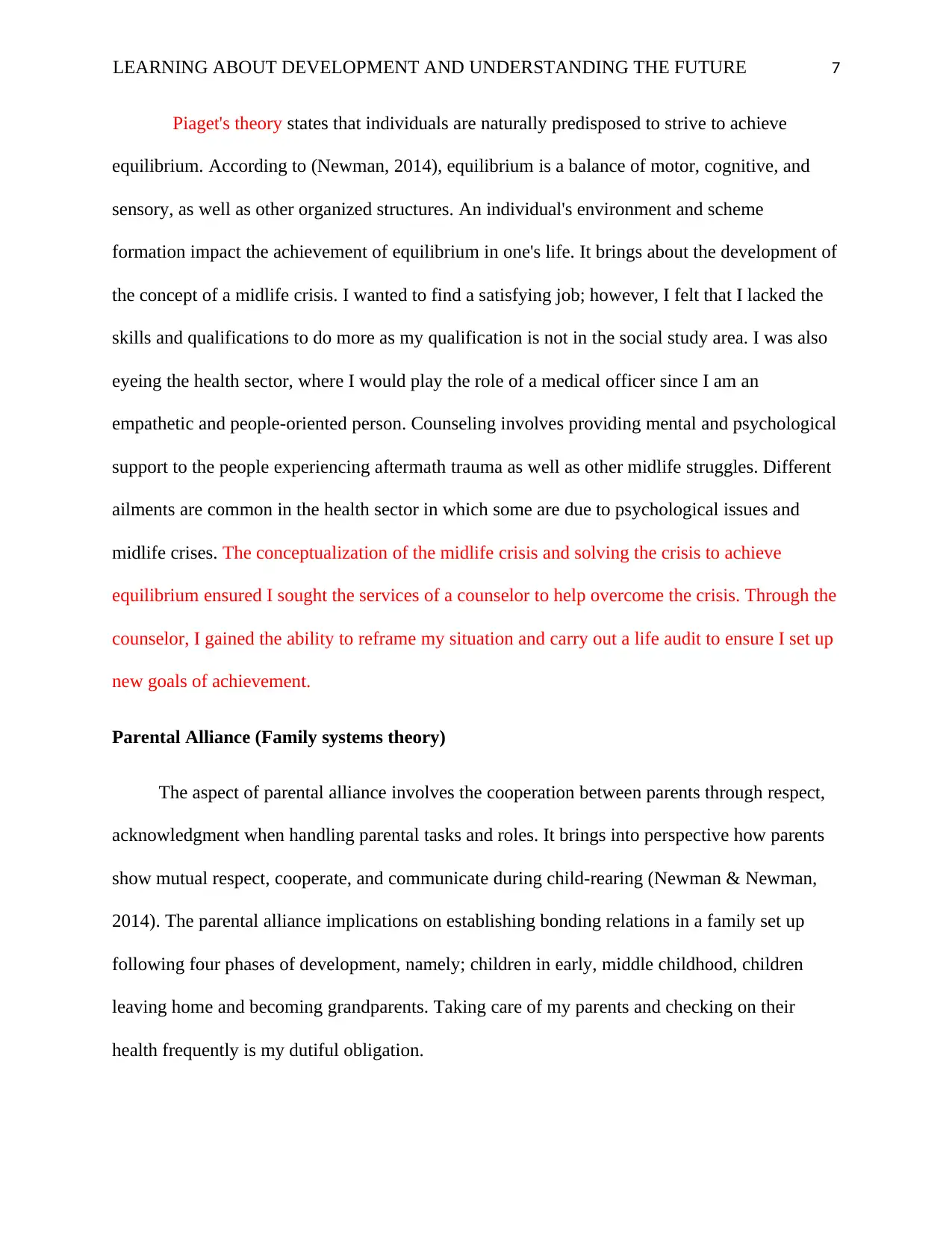
LEARNING ABOUT DEVELOPMENT AND UNDERSTANDING THE FUTURE 7
Piaget's theory states that individuals are naturally predisposed to strive to achieve
equilibrium. According to (Newman, 2014), equilibrium is a balance of motor, cognitive, and
sensory, as well as other organized structures. An individual's environment and scheme
formation impact the achievement of equilibrium in one's life. It brings about the development of
the concept of a midlife crisis. I wanted to find a satisfying job; however, I felt that I lacked the
skills and qualifications to do more as my qualification is not in the social study area. I was also
eyeing the health sector, where I would play the role of a medical officer since I am an
empathetic and people-oriented person. Counseling involves providing mental and psychological
support to the people experiencing aftermath trauma as well as other midlife struggles. Different
ailments are common in the health sector in which some are due to psychological issues and
midlife crises. The conceptualization of the midlife crisis and solving the crisis to achieve
equilibrium ensured I sought the services of a counselor to help overcome the crisis. Through the
counselor, I gained the ability to reframe my situation and carry out a life audit to ensure I set up
new goals of achievement.
Parental Alliance (Family systems theory)
The aspect of parental alliance involves the cooperation between parents through respect,
acknowledgment when handling parental tasks and roles. It brings into perspective how parents
show mutual respect, cooperate, and communicate during child-rearing (Newman & Newman,
2014). The parental alliance implications on establishing bonding relations in a family set up
following four phases of development, namely; children in early, middle childhood, children
leaving home and becoming grandparents. Taking care of my parents and checking on their
health frequently is my dutiful obligation.
Piaget's theory states that individuals are naturally predisposed to strive to achieve
equilibrium. According to (Newman, 2014), equilibrium is a balance of motor, cognitive, and
sensory, as well as other organized structures. An individual's environment and scheme
formation impact the achievement of equilibrium in one's life. It brings about the development of
the concept of a midlife crisis. I wanted to find a satisfying job; however, I felt that I lacked the
skills and qualifications to do more as my qualification is not in the social study area. I was also
eyeing the health sector, where I would play the role of a medical officer since I am an
empathetic and people-oriented person. Counseling involves providing mental and psychological
support to the people experiencing aftermath trauma as well as other midlife struggles. Different
ailments are common in the health sector in which some are due to psychological issues and
midlife crises. The conceptualization of the midlife crisis and solving the crisis to achieve
equilibrium ensured I sought the services of a counselor to help overcome the crisis. Through the
counselor, I gained the ability to reframe my situation and carry out a life audit to ensure I set up
new goals of achievement.
Parental Alliance (Family systems theory)
The aspect of parental alliance involves the cooperation between parents through respect,
acknowledgment when handling parental tasks and roles. It brings into perspective how parents
show mutual respect, cooperate, and communicate during child-rearing (Newman & Newman,
2014). The parental alliance implications on establishing bonding relations in a family set up
following four phases of development, namely; children in early, middle childhood, children
leaving home and becoming grandparents. Taking care of my parents and checking on their
health frequently is my dutiful obligation.
Paraphrase This Document
Need a fresh take? Get an instant paraphrase of this document with our AI Paraphraser
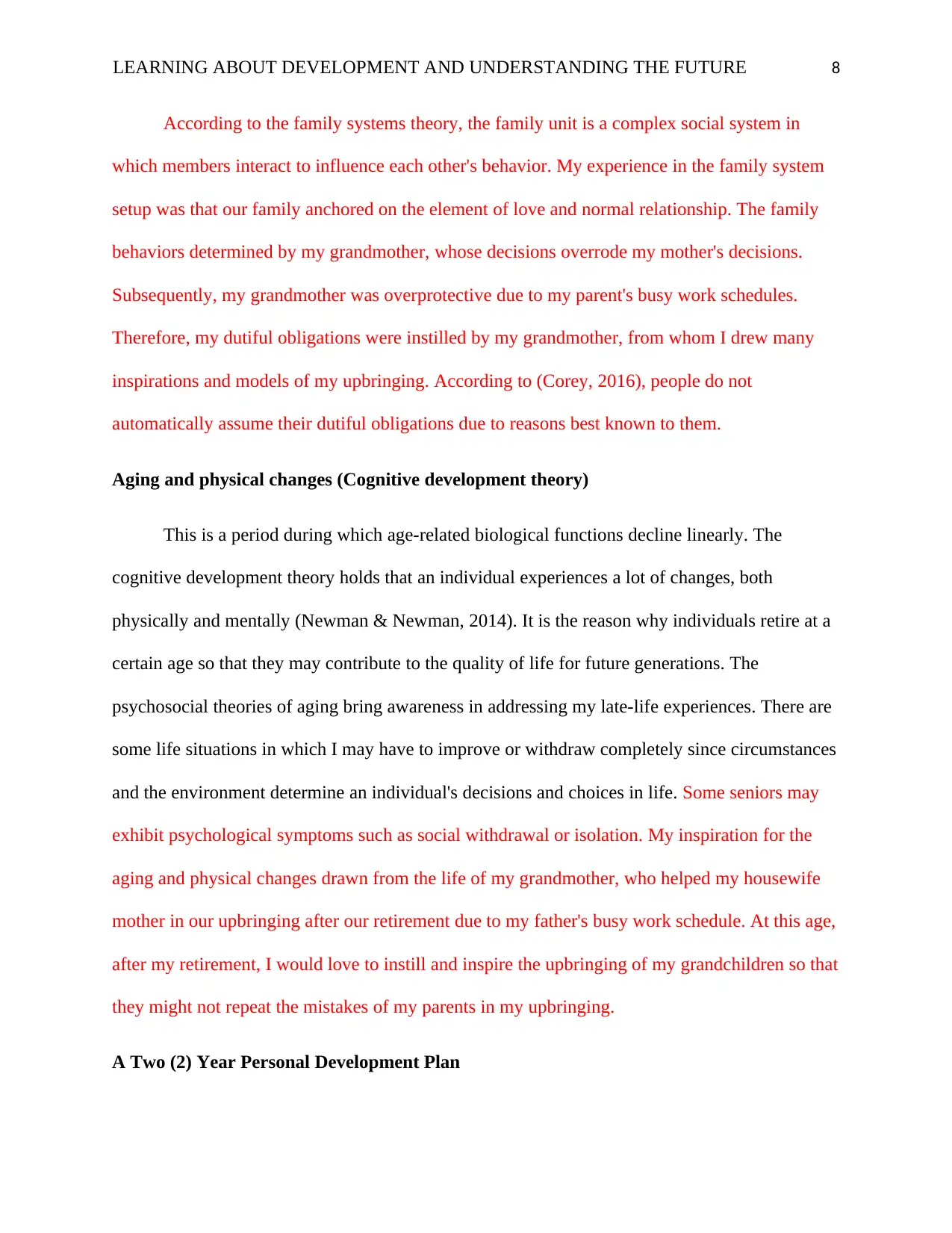
LEARNING ABOUT DEVELOPMENT AND UNDERSTANDING THE FUTURE 8
According to the family systems theory, the family unit is a complex social system in
which members interact to influence each other's behavior. My experience in the family system
setup was that our family anchored on the element of love and normal relationship. The family
behaviors determined by my grandmother, whose decisions overrode my mother's decisions.
Subsequently, my grandmother was overprotective due to my parent's busy work schedules.
Therefore, my dutiful obligations were instilled by my grandmother, from whom I drew many
inspirations and models of my upbringing. According to (Corey, 2016), people do not
automatically assume their dutiful obligations due to reasons best known to them.
Aging and physical changes (Cognitive development theory)
This is a period during which age-related biological functions decline linearly. The
cognitive development theory holds that an individual experiences a lot of changes, both
physically and mentally (Newman & Newman, 2014). It is the reason why individuals retire at a
certain age so that they may contribute to the quality of life for future generations. The
psychosocial theories of aging bring awareness in addressing my late-life experiences. There are
some life situations in which I may have to improve or withdraw completely since circumstances
and the environment determine an individual's decisions and choices in life. Some seniors may
exhibit psychological symptoms such as social withdrawal or isolation. My inspiration for the
aging and physical changes drawn from the life of my grandmother, who helped my housewife
mother in our upbringing after our retirement due to my father's busy work schedule. At this age,
after my retirement, I would love to instill and inspire the upbringing of my grandchildren so that
they might not repeat the mistakes of my parents in my upbringing.
A Two (2) Year Personal Development Plan
According to the family systems theory, the family unit is a complex social system in
which members interact to influence each other's behavior. My experience in the family system
setup was that our family anchored on the element of love and normal relationship. The family
behaviors determined by my grandmother, whose decisions overrode my mother's decisions.
Subsequently, my grandmother was overprotective due to my parent's busy work schedules.
Therefore, my dutiful obligations were instilled by my grandmother, from whom I drew many
inspirations and models of my upbringing. According to (Corey, 2016), people do not
automatically assume their dutiful obligations due to reasons best known to them.
Aging and physical changes (Cognitive development theory)
This is a period during which age-related biological functions decline linearly. The
cognitive development theory holds that an individual experiences a lot of changes, both
physically and mentally (Newman & Newman, 2014). It is the reason why individuals retire at a
certain age so that they may contribute to the quality of life for future generations. The
psychosocial theories of aging bring awareness in addressing my late-life experiences. There are
some life situations in which I may have to improve or withdraw completely since circumstances
and the environment determine an individual's decisions and choices in life. Some seniors may
exhibit psychological symptoms such as social withdrawal or isolation. My inspiration for the
aging and physical changes drawn from the life of my grandmother, who helped my housewife
mother in our upbringing after our retirement due to my father's busy work schedule. At this age,
after my retirement, I would love to instill and inspire the upbringing of my grandchildren so that
they might not repeat the mistakes of my parents in my upbringing.
A Two (2) Year Personal Development Plan
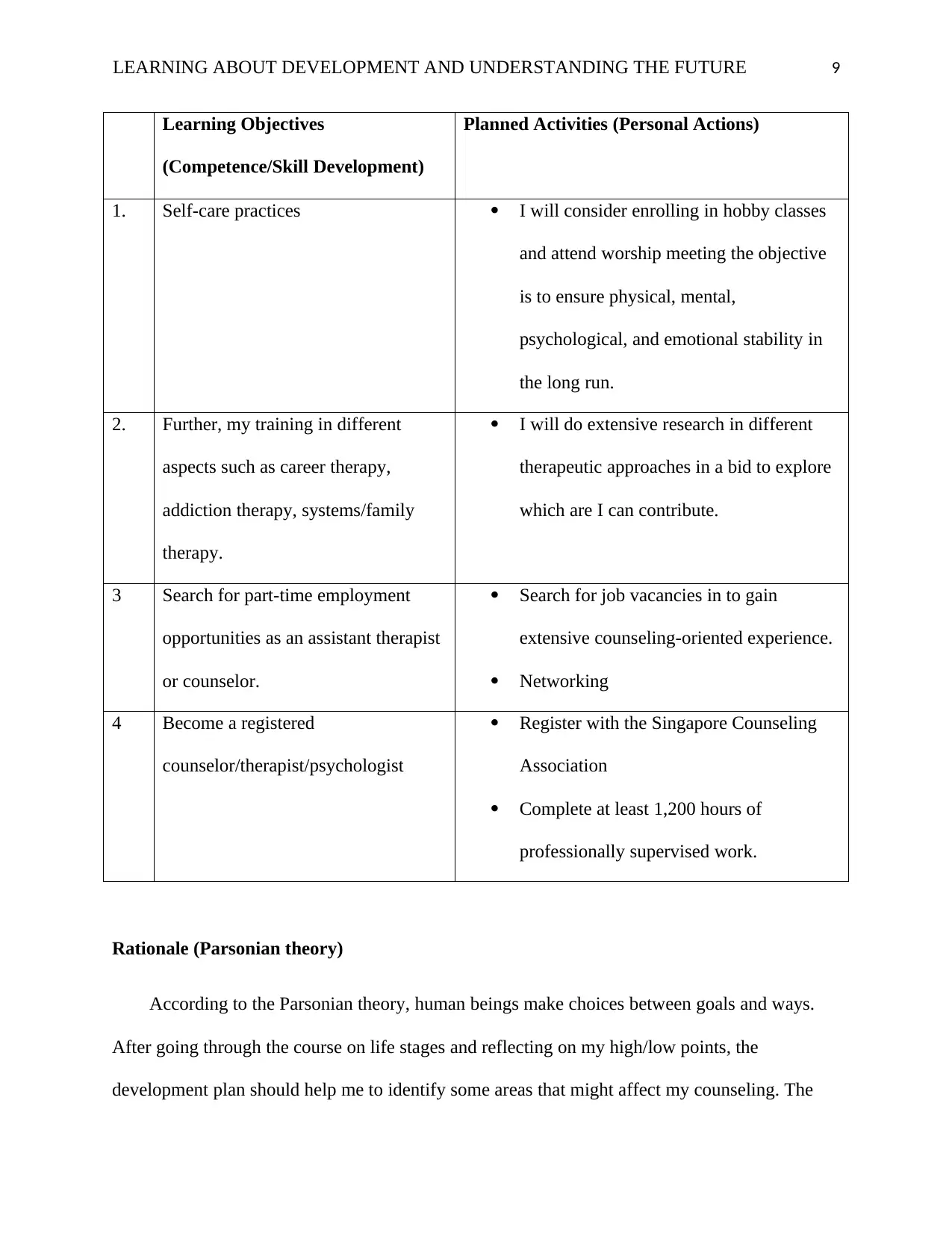
LEARNING ABOUT DEVELOPMENT AND UNDERSTANDING THE FUTURE 9
Learning Objectives
(Competence/Skill Development)
Planned Activities (Personal Actions)
1. Self-care practices I will consider enrolling in hobby classes
and attend worship meeting the objective
is to ensure physical, mental,
psychological, and emotional stability in
the long run.
2. Further, my training in different
aspects such as career therapy,
addiction therapy, systems/family
therapy.
I will do extensive research in different
therapeutic approaches in a bid to explore
which are I can contribute.
3 Search for part-time employment
opportunities as an assistant therapist
or counselor.
Search for job vacancies in to gain
extensive counseling-oriented experience.
Networking
4 Become a registered
counselor/therapist/psychologist
Register with the Singapore Counseling
Association
Complete at least 1,200 hours of
professionally supervised work.
Rationale (Parsonian theory)
According to the Parsonian theory, human beings make choices between goals and ways.
After going through the course on life stages and reflecting on my high/low points, the
development plan should help me to identify some areas that might affect my counseling. The
Learning Objectives
(Competence/Skill Development)
Planned Activities (Personal Actions)
1. Self-care practices I will consider enrolling in hobby classes
and attend worship meeting the objective
is to ensure physical, mental,
psychological, and emotional stability in
the long run.
2. Further, my training in different
aspects such as career therapy,
addiction therapy, systems/family
therapy.
I will do extensive research in different
therapeutic approaches in a bid to explore
which are I can contribute.
3 Search for part-time employment
opportunities as an assistant therapist
or counselor.
Search for job vacancies in to gain
extensive counseling-oriented experience.
Networking
4 Become a registered
counselor/therapist/psychologist
Register with the Singapore Counseling
Association
Complete at least 1,200 hours of
professionally supervised work.
Rationale (Parsonian theory)
According to the Parsonian theory, human beings make choices between goals and ways.
After going through the course on life stages and reflecting on my high/low points, the
development plan should help me to identify some areas that might affect my counseling. The
⊘ This is a preview!⊘
Do you want full access?
Subscribe today to unlock all pages.

Trusted by 1+ million students worldwide
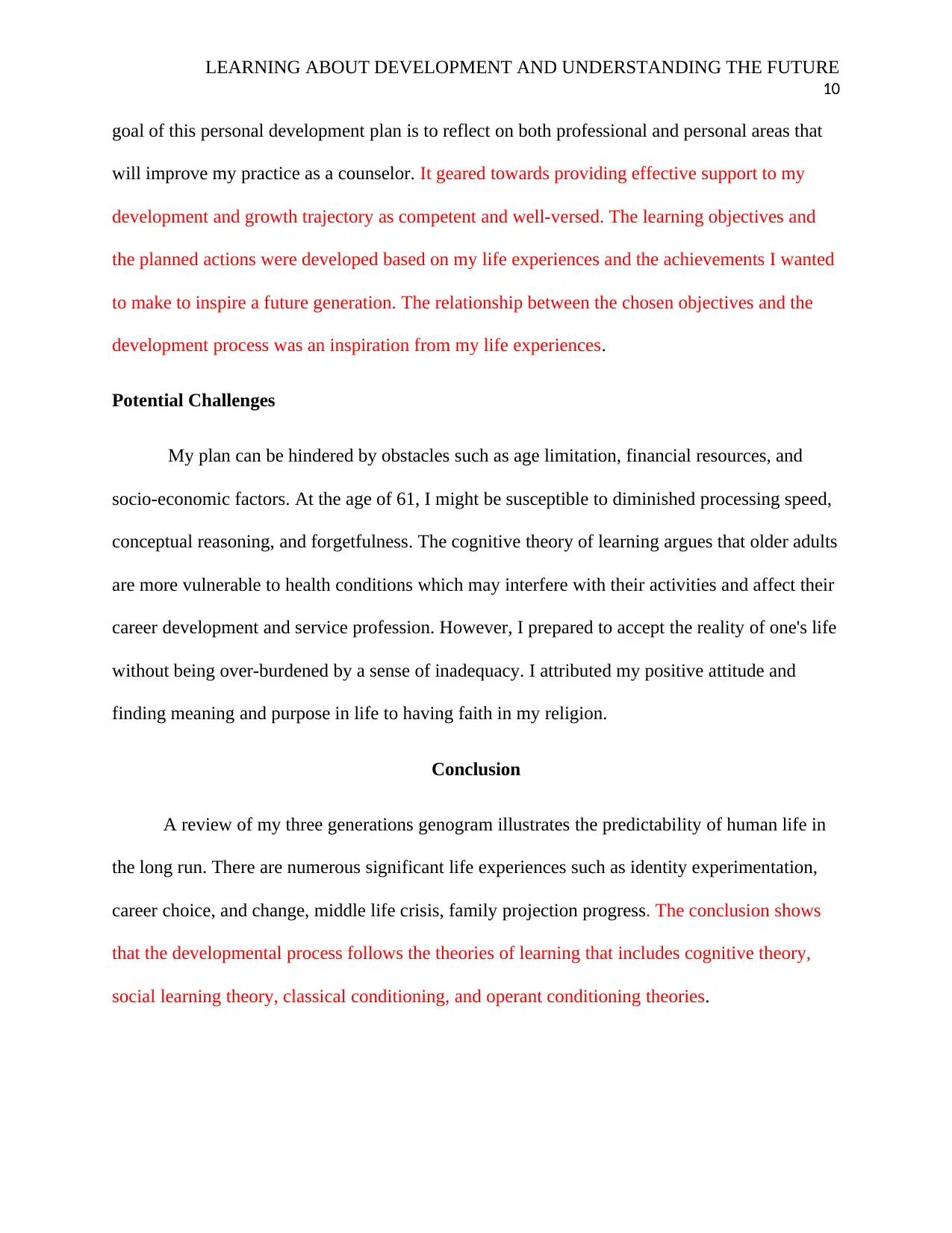
LEARNING ABOUT DEVELOPMENT AND UNDERSTANDING THE FUTURE
10
goal of this personal development plan is to reflect on both professional and personal areas that
will improve my practice as a counselor. It geared towards providing effective support to my
development and growth trajectory as competent and well-versed. The learning objectives and
the planned actions were developed based on my life experiences and the achievements I wanted
to make to inspire a future generation. The relationship between the chosen objectives and the
development process was an inspiration from my life experiences.
Potential Challenges
My plan can be hindered by obstacles such as age limitation, financial resources, and
socio-economic factors. At the age of 61, I might be susceptible to diminished processing speed,
conceptual reasoning, and forgetfulness. The cognitive theory of learning argues that older adults
are more vulnerable to health conditions which may interfere with their activities and affect their
career development and service profession. However, I prepared to accept the reality of one's life
without being over-burdened by a sense of inadequacy. I attributed my positive attitude and
finding meaning and purpose in life to having faith in my religion.
Conclusion
A review of my three generations genogram illustrates the predictability of human life in
the long run. There are numerous significant life experiences such as identity experimentation,
career choice, and change, middle life crisis, family projection progress. The conclusion shows
that the developmental process follows the theories of learning that includes cognitive theory,
social learning theory, classical conditioning, and operant conditioning theories.
10
goal of this personal development plan is to reflect on both professional and personal areas that
will improve my practice as a counselor. It geared towards providing effective support to my
development and growth trajectory as competent and well-versed. The learning objectives and
the planned actions were developed based on my life experiences and the achievements I wanted
to make to inspire a future generation. The relationship between the chosen objectives and the
development process was an inspiration from my life experiences.
Potential Challenges
My plan can be hindered by obstacles such as age limitation, financial resources, and
socio-economic factors. At the age of 61, I might be susceptible to diminished processing speed,
conceptual reasoning, and forgetfulness. The cognitive theory of learning argues that older adults
are more vulnerable to health conditions which may interfere with their activities and affect their
career development and service profession. However, I prepared to accept the reality of one's life
without being over-burdened by a sense of inadequacy. I attributed my positive attitude and
finding meaning and purpose in life to having faith in my religion.
Conclusion
A review of my three generations genogram illustrates the predictability of human life in
the long run. There are numerous significant life experiences such as identity experimentation,
career choice, and change, middle life crisis, family projection progress. The conclusion shows
that the developmental process follows the theories of learning that includes cognitive theory,
social learning theory, classical conditioning, and operant conditioning theories.
Paraphrase This Document
Need a fresh take? Get an instant paraphrase of this document with our AI Paraphraser
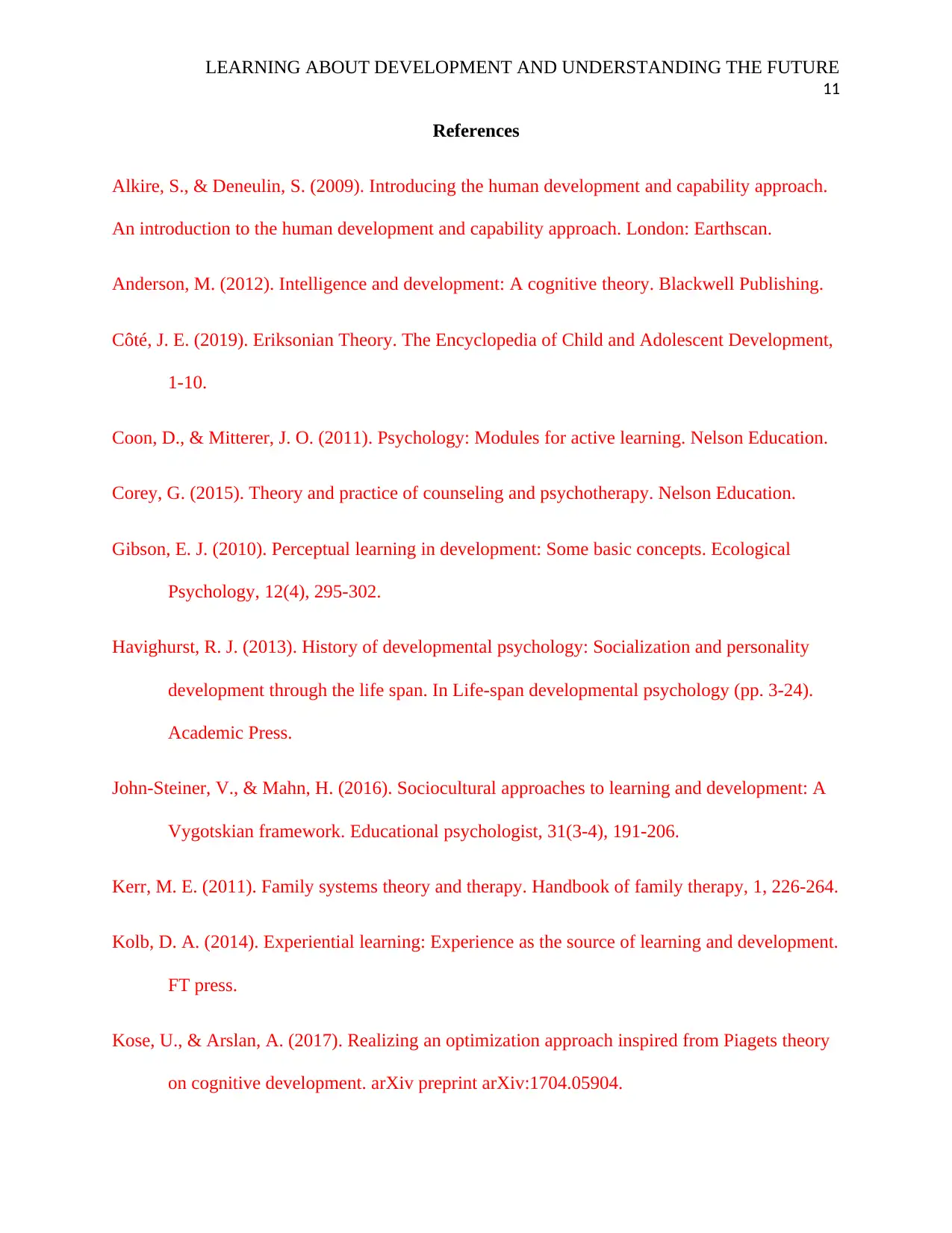
LEARNING ABOUT DEVELOPMENT AND UNDERSTANDING THE FUTURE
11
References
Alkire, S., & Deneulin, S. (2009). Introducing the human development and capability approach.
An introduction to the human development and capability approach. London: Earthscan.
Anderson, M. (2012). Intelligence and development: A cognitive theory. Blackwell Publishing.
Côté, J. E. (2019). Eriksonian Theory. The Encyclopedia of Child and Adolescent Development,
1-10.
Coon, D., & Mitterer, J. O. (2011). Psychology: Modules for active learning. Nelson Education.
Corey, G. (2015). Theory and practice of counseling and psychotherapy. Nelson Education.
Gibson, E. J. (2010). Perceptual learning in development: Some basic concepts. Ecological
Psychology, 12(4), 295-302.
Havighurst, R. J. (2013). History of developmental psychology: Socialization and personality
development through the life span. In Life-span developmental psychology (pp. 3-24).
Academic Press.
John-Steiner, V., & Mahn, H. (2016). Sociocultural approaches to learning and development: A
Vygotskian framework. Educational psychologist, 31(3-4), 191-206.
Kerr, M. E. (2011). Family systems theory and therapy. Handbook of family therapy, 1, 226-264.
Kolb, D. A. (2014). Experiential learning: Experience as the source of learning and development.
FT press.
Kose, U., & Arslan, A. (2017). Realizing an optimization approach inspired from Piagets theory
on cognitive development. arXiv preprint arXiv:1704.05904.
11
References
Alkire, S., & Deneulin, S. (2009). Introducing the human development and capability approach.
An introduction to the human development and capability approach. London: Earthscan.
Anderson, M. (2012). Intelligence and development: A cognitive theory. Blackwell Publishing.
Côté, J. E. (2019). Eriksonian Theory. The Encyclopedia of Child and Adolescent Development,
1-10.
Coon, D., & Mitterer, J. O. (2011). Psychology: Modules for active learning. Nelson Education.
Corey, G. (2015). Theory and practice of counseling and psychotherapy. Nelson Education.
Gibson, E. J. (2010). Perceptual learning in development: Some basic concepts. Ecological
Psychology, 12(4), 295-302.
Havighurst, R. J. (2013). History of developmental psychology: Socialization and personality
development through the life span. In Life-span developmental psychology (pp. 3-24).
Academic Press.
John-Steiner, V., & Mahn, H. (2016). Sociocultural approaches to learning and development: A
Vygotskian framework. Educational psychologist, 31(3-4), 191-206.
Kerr, M. E. (2011). Family systems theory and therapy. Handbook of family therapy, 1, 226-264.
Kolb, D. A. (2014). Experiential learning: Experience as the source of learning and development.
FT press.
Kose, U., & Arslan, A. (2017). Realizing an optimization approach inspired from Piagets theory
on cognitive development. arXiv preprint arXiv:1704.05904.
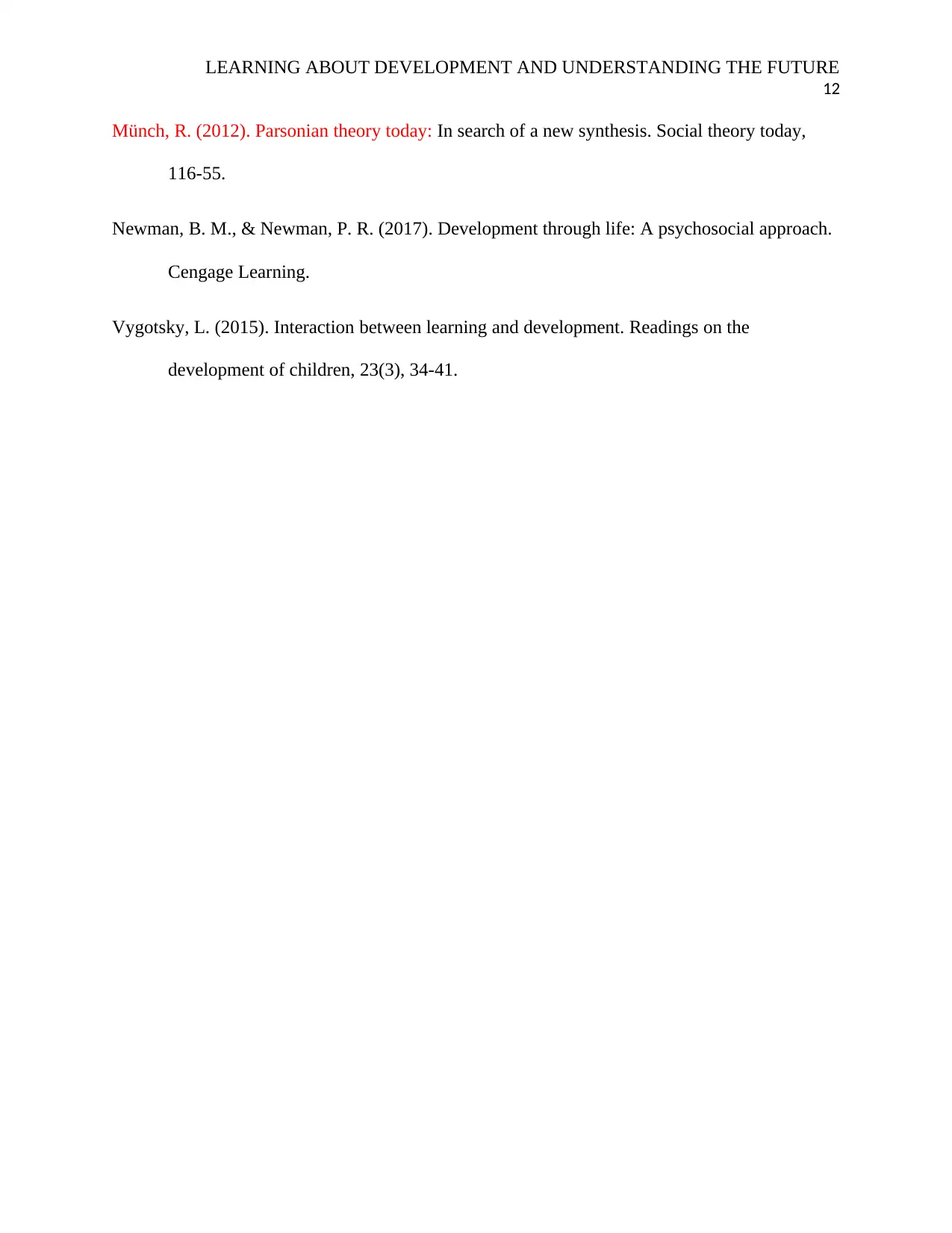
LEARNING ABOUT DEVELOPMENT AND UNDERSTANDING THE FUTURE
12
Münch, R. (2012). Parsonian theory today: In search of a new synthesis. Social theory today,
116-55.
Newman, B. M., & Newman, P. R. (2017). Development through life: A psychosocial approach.
Cengage Learning.
Vygotsky, L. (2015). Interaction between learning and development. Readings on the
development of children, 23(3), 34-41.
12
Münch, R. (2012). Parsonian theory today: In search of a new synthesis. Social theory today,
116-55.
Newman, B. M., & Newman, P. R. (2017). Development through life: A psychosocial approach.
Cengage Learning.
Vygotsky, L. (2015). Interaction between learning and development. Readings on the
development of children, 23(3), 34-41.
⊘ This is a preview!⊘
Do you want full access?
Subscribe today to unlock all pages.

Trusted by 1+ million students worldwide
1 out of 12
Related Documents
Your All-in-One AI-Powered Toolkit for Academic Success.
+13062052269
info@desklib.com
Available 24*7 on WhatsApp / Email
![[object Object]](/_next/static/media/star-bottom.7253800d.svg)
Unlock your academic potential
Copyright © 2020–2026 A2Z Services. All Rights Reserved. Developed and managed by ZUCOL.




